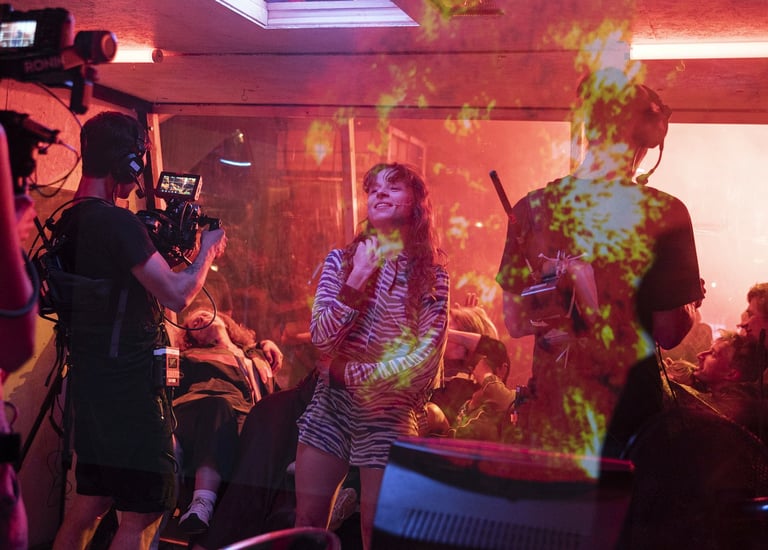

What could a more just world look like? How can we shape a more environmentally conscious, peaceful society, one that recognizes the gaping void within it and draws the consequences from the realization that the idea of freedom must be connected not only to individual interests but also to the social? What kind of history of tomorrow can we create? How can community succeed despite all current tendencies toward radicalization?
The multilingual ensemble led by director, video artist, and raver Łukasz Twarkowski undertook a self-experiment. For several weeks, they followed the example of earlier dropouts in human history, withdrawing from the flow of time, cutting off their everyday lives, retreating into the Lithuanian forests and confronting existential questions, but also their despair and desire. Twarkowski accompanied this process with his camera and, together with author Joanna Bednarczyk, visual artist Fabien Lédé, composer Bogumil Misala, DJ SPECTRIBE, choreographer Paweł Sakowicz, and the actors, created a complex portrait of the present, with all its social challenges and individual hardships. The result for the stage is a six-hour mockumentary that chooses perspectives from the past and future to bring our times into focus. Techno, film, theater, and visual art combine to create a world of their own this evening. The audience is invited to explore it freely: to come, go, observe, become part of it, dance with the performers, eat, take a sauna, and reflect with them on new forms of coexistence. Ultimately, the rave stands as a resistance against the powerlessness of our time.
With Diana Anevičiūtė, Algirdas Dainavičius, Jan Dravnel, Airida Gintautaitė, Ula Liagaitė, Martynas Nedzinskas, Valentinas Novopolskis, Augustė Pociūtė, Gediminas Rimeika, Rytis Saladžius, Rasa Samauolytė, Nelė Savičenko, Vainius Sodeika, Komi Togbonou Directed by Łukasz Twarkowski Production Management Vidas Bizunevičius Text, Dramaturge Joanna Bednarczyk Stage Design Fabien Lédé Video Design Karol Rakowski, Adomas Gustainis Choreography Paweł Sakowicz Composition Bogumił Misala Costumes Svenja Gassen Lightning Design Julius Kuršys, Dainius Urbonis Stage Karolis Juknys Assistant Director Eglė Švedkauskaitė Assistant Dramaturge Simona Jurkuvėnaitė Assistant Stage Designer Rokas Valiauga Cinematography Simonas Glinskis Sound Design Karolis Drėma, Adomas Koreniukas Lightning Edvardas Osinskis, Dainius Urbonis Video Adomas Gustainis Camera Šarūnas Liudas Prišmontas, Naglis Kristijonas Zakaras, Ričard Žigis Editing Vytenis Kriščiūnas Assistant Production Management Lukrecija Gužauskaitė Translation Vyturys Jarutis
A production of the Lithuania National Drama Theatre in co-production with the Munich Kammerspiele.

RESPUBLIKA
(2020-2025)
[selected works]
[performance]
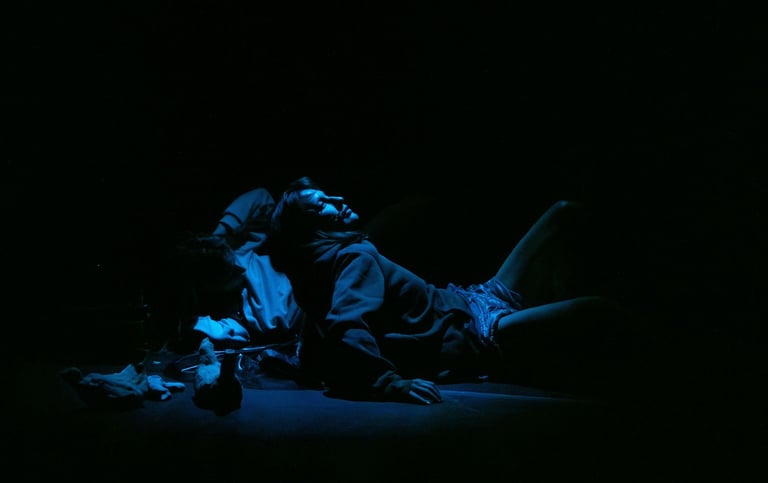

Ce qu'on doit à la nuit
(2024)
Distribution Artistic direction, choreography and interpretation Eve Chariatte, Interpretation and assistance with movement research Ula Liagaitė Recordings and sound design Eleonora Polato and Louis Riondel Lighting design Barbara Meuli Scenography Vera Trachsel External perspective and assistance with dramaturgy Adina Secretan Assistance with movement research Dafni Stefanou Administration and assistance with distribution PROD'ACTION, Lino Eden and Sophie Fontaine Production ecco

[movement research / performance]
What we owe to the night
"For this new stage creation, I draw on the imagination of the figures of the night, solitary and hybrid figures. Although nighttime and sleep have been gradually taken over by capitalism (Jonathan Crary), the night still remains largely a space of resistance and poetry, outside the productive diurnal time. Street lights are going out village after village, certain birds are finding a space for expression, nighttime radio broadcasts are weaving a sonic link with our emotions. I hypothesize that this is a time for what wavers, for the wavering, a notion that signifies both losing balance and sparkling." Eve Chariatte
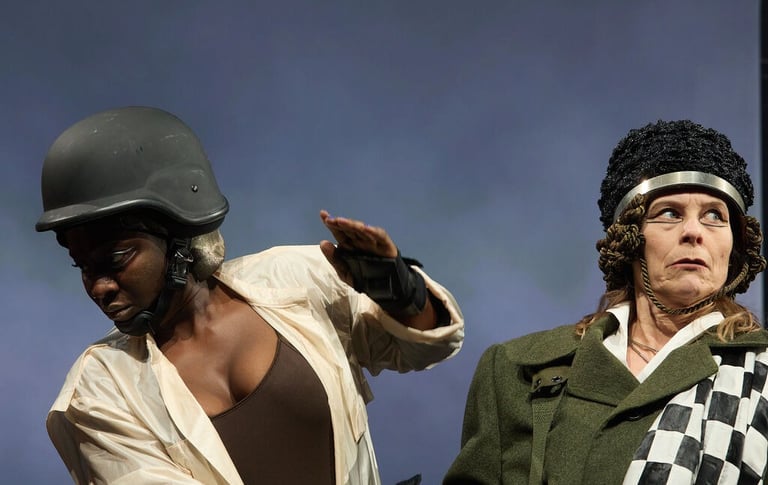

ANTIGONE
(2023)
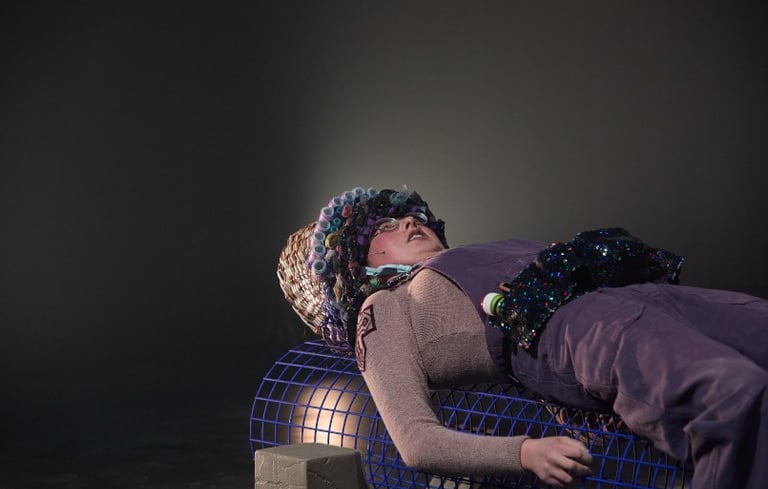

Sophocles' Antigone is a classic Greek tragedy that remains relevant today because of its profound themes and characters. The plot revolves around a confrontation between Antigone and her uncle Creon. Antigone and Creon hold different beliefs and values, leading to conflict and confrontation. Is there understanding despite their differing views? Antigone says that people have a right to a place to rest after death—a grave. She rebels against her uncle Creon. And what happens to a newly crowned king when such an adversary threatens him before he has established his authority? How does he react in this situation? Does he consider the crisis from all angles and consider what is best for the city he rules?
Interest in Sophocles' Antigone remains alive today. Which ghosts of the past do we still carry with us, and how do we process what we inherited from generations before us? This production explores the question of where understanding and empathy end. By translating Sophocles' play into Easy Language and offering an alternative ending, the ancient story is rewritten.
The language version of the play is based on the 2,400-year-old original edition by Sophocles and scenes from Jean Anouilh's 1946 version. In collaboration with people with Down syndrome, the result is more than a simple translation; rather, it is an original version of the play in easy language. The short, concise sentences in the dialogues bring the characters' personalities into sharp focus, bringing their conflicts directly to the surface. In this version, Anti · gone demonstrates how relevant the major questions of Greek drama are: How do we deal with different values and ideas? How do we negotiate power and responsibility? What do conflicts do to us? What is the price of oppression? Can we break out of the cycle of violence?
With Sebastian Brandes , Johanna Eiworth , Dennis Fell-Hernandez , Frangiskos Kakoulakis , Johanna Kappauf , Nadège Meta Kanku Directed by Nele Jahnke Stage Sabina Winkler Costume Lea Søvsø Musical direction Hans-Jakob Christian Mühlethaler Choreography Ula Liagaitė Dramaturgy Rania Mleihi Video Hanieh Bozorgnia
[choreography]
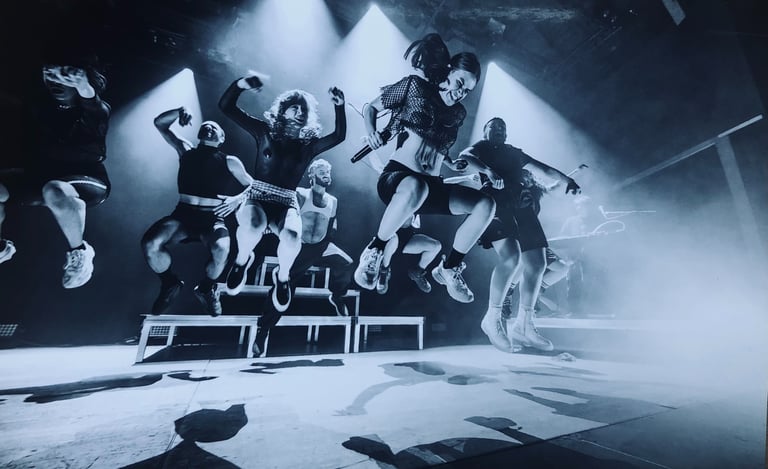

BABY VOLCANO + FAMILIA EXPANDIDAAA
(2023)

Directed by Lorena Stadelmann Choreography by Ula Liagaité, Nayla Altieri, Martin Wollmann, Lorena Stadelmann Dancers Ula Liagaité, Nayla Altieri, Martin Wollmann, Evo Lambillon, Isa Abad, Jasmin Sisti, Géraldine Chollet, Melissa Guex Musicians Louis Riondel, Ines Mouzoune, Louis Jucker Feat Nathalie Froehlich, Rebecca Solari Sound engineer Iannis Valvini Light engineers Lea Martinez, Guillaume Ducommun Management Loris Vettese, Jona Nido Administration Minuit Pile
[choreography / performance]
Baby Volcano is a Swiss-Guatemalan artist who erupted onto the Swiss underground scene with her debut EP Síndrome Premenstrual (2021). Trained in contemporary dance and performance in Buenos Aires, she captivates audiences with her powerful, sensitive, and avant-garde live shows. In just two years, she has performed at major festivals across Europe, including Roskilde, Eurockéennes de Belfort, Paléo Festival, Dour Festival, Les Vieilles Charrues, Transmusicales, and many more. 2024 saw her push artistic boundaries further with a festival tour in Quebec ( Jazz à Montréal, Les Fêtes de Québec, La Noce ) and a landmark performance at the SAKIFO Festival on Réunion Island. Baby Volcano’s hybrid, visceral, and boundary-pushing music, combined with her bold creative vision, continues to redefine the standards of contemporary artistic expression.


SICK WOMAN PRACTICE
(2019)
Choreography and Performance Ula Liagaitė Sound 6P3S vs Kotori Rumble Sound Edit Mikas Zabulionis Light Design and Production Bartė Liagaitė Technical Assistance Lukas Mykolaitis Video Edit Martin Sandoval
Premiere @ 29th International Dance Festival Aura, Kaunas, Lithuania 2019 October
[choreography / performance]
Through this work, I looked at the human body as something that can “fix” itself if given the appropriate care and conditions. This pattern of thought is inspired by Johana Hedva - a contemporary artist, writer, and musician, driven by my ongoing interest in various healing practices and conversations about what it means to be healthy and to ‘keep going’. I ask: what is the position of the body, healthy or sick, in the society that we live in?
In the following excerpt of text Johana Hedva re- phrases a thought by Starhawk, from her book “Dreaming the Dark '', 1982.
“Psychologists have constructed a myth – that somewhere there exists some state of health which is the norm, meaning that most people presumably are in that state, and those who are anxious, depressed, neurotic, distressed, or generally unhappy are deviant.” I’d here supplant the word “psychologists” with “white supremacy,” “doctors,” “your boss,” “neoliberalism,” “heteronormativity,” and “America.'' Johana Hedva, “Sick Woman Theory”, 2015.
‘Sick Woman Practice’ aims to uncover and expose the automatism in the way we see, talk and relate to each other.
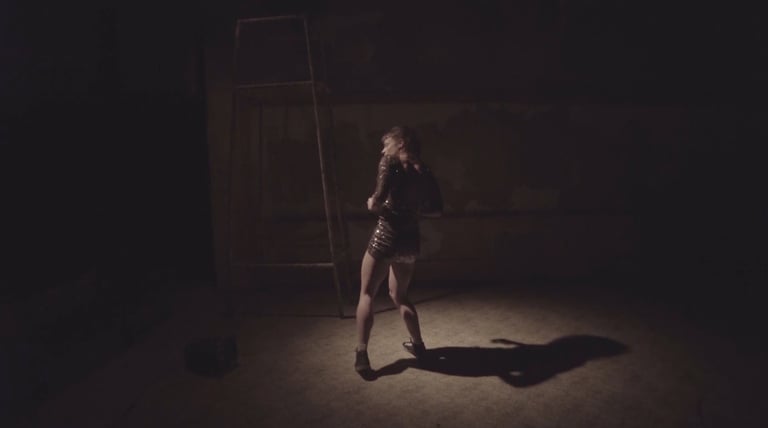

DUET,
THAT HAPPENED (2018)
‘<...> Liagaitės write in the program note that, like the experience of watching Tornado, ‘this piece is about a particular feeling that there’s always something bigger than us.’ The duet that is about to happen is already inevitable because the two objects, one human and one mechanical, are drawn to each other by both the object’s offer of experience and Liagaitė’s will to accept it. U. Liagaitė approaches the object with reverence before familiarizing herself with its surfaces; there is something of an encounter between two lovers, sensing the perimeters of the body and its contours. However, getting inside the structure was never going to be seamless; she has set herself the choreographic task of climbing into a sculptural object that is static — unlike the whirlwind — in order to fulfil its promise of motion. A slight hesitation is perhaps expected at the threshold of a new experience, but once the resistance is overcome U. Liagaitė sets the cylinders turning from her invisible place inside. We only hear her breathy voice above the whirling sound as a witness of her achievement: ‘I might just be here in the heart of the storm…I feel like I have no control over this thing…’ The duet has started and the pair remains in a dynamic, poetic embrace until the end <...>’ N. Minns, I. Abbott, 2018, Writing About Dance
Idea Ula and Bartė Liagaitės Choreography and performance Ula Liagaitė Scenography and light Bartė Liagaitė Sound and performance Mikas Zabulionis
Premiere @ New Baltic Dance Festival May 2018,Vilnius, Lithuania
[choreography / performance]
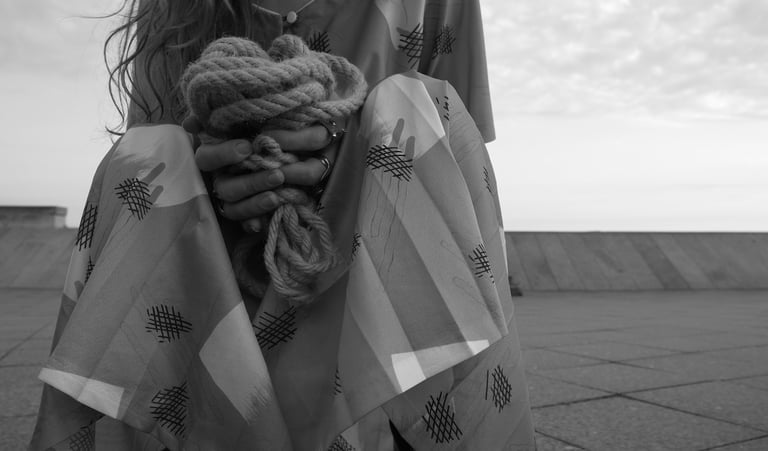

“Una chiva" premiered in 1999 in Buenos Aires, directed and performed by Viviana Iasparra.
In 2017, a performance based on "Una chiva" was presented in teatro Kafka, in Buenos Aires, Argentina, performed by Ula Liagaitė. Since then, a connection has formed between [la oTra] and Liagaitė, joined by an artistic team from Lithuania. These intersections shape the recreation of the work. Out of the desire and interest to continue exploring vital and committed practices, the 2021 version of “Una chiva” emerged. This version brings into dialogue the possibilities of live performance with previous audiovisual materials—both videos of the original work and rehearsal recordings—culminating in a kaleidoscopic piece. In this way, Una chiva becomes a practice, an exercise, an infinite rehearsal.
UNA CHIVA / OŽKA
(2017-2021)
Una Chiva / Ožka 2021
Performance + audiovisual installation
Live performance Ula Liagaitė Video performance Viviana Iasparra, Ula Liagaitė, Natalia Jorquera
Director Viviana Iasparra Director’s assistant Patricia Bova Sound Timoteo Padilla Light Viviana Iasparra
Images Carla León Pino, Marta Maluva Visuals Patricia Bova Digital and graphic arts Andrea López
Producion la oTra cia. de baile, Bartė Liagaitė, Aušra Degutytė-Kančauskienė
[performance]
